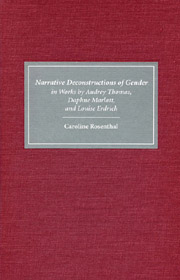Book contents
- Frontmatter
- Contents
- Dedication
- Preface and Acknowledgments
- Abbreviations
- Introduction
- 1 Framing Theories
- 2 “Alice Hoyle: 1,000 Interlocking Pieces”: Identity Deconstructions in Audrey Thomas's Intertidal Life
- 3 “You Can't Even Imagine?”: Monstrous Possibilities of Female Identity in Daphne Marlatt's Ana Historic
- 4 “Her Laugh an Ace”: Narrative Tricksterism in Louise Erdrich's Tetralogy
- Conclusion
- Works Consulted
- Index
Introduction
Published online by Cambridge University Press: 05 February 2013
- Frontmatter
- Contents
- Dedication
- Preface and Acknowledgments
- Abbreviations
- Introduction
- 1 Framing Theories
- 2 “Alice Hoyle: 1,000 Interlocking Pieces”: Identity Deconstructions in Audrey Thomas's Intertidal Life
- 3 “You Can't Even Imagine?”: Monstrous Possibilities of Female Identity in Daphne Marlatt's Ana Historic
- 4 “Her Laugh an Ace”: Narrative Tricksterism in Louise Erdrich's Tetralogy
- Conclusion
- Works Consulted
- Index
Summary
Beginnings gather those dilatory moments when you hesitate, evaluate. Beginnings are when you need to locate where you are, with people or places. Introductions, mappings, initiations. Novels and life open cautiously.
Aritha van Herk, Places Far from EllesmereOver the last few decades, the concepts of “gender,” “identity,” and “narrative” have received growing attention in nearly every field of academic study. Gender has become an important analytical tool in many disciplines because of the insight it gives into the cultural orders underlying representations. Theories of subjectivity have illustrated that identity is not something we achieve and possess but something individuals must consistently reestablish in various social contexts and through a number of symbolic practices. One such symbolic practice is narrative. Through a coherent structure, and by drawing on familiar forms, narrative both constitutes and naturalizes concepts at the same time. The realization that gender and identity are not described by, but are constituted in, signifying practices has engendered a greater awareness for how texts perform gender, sex, or sexuality, for instance. As feminist critics and writers have shown, narrative not only consolidates gender but can be a strategic tool in dismantling stereotypical representations of gender.
This book explores the correlation between gender identity formation and narrative. While drawing on feminist as well as cultural studies theories, part of my methodology will be the close reading of key passages in the texts of three women writers who in their narrative style deconstruct the fiction of a factual, a given, gender.
- Type
- Chapter
- Information
- Narrative Deconstructions of Gender in Works by Audrey Thomas, Daphne Marlatt, and Louise Erdrich , pp. 1 - 6Publisher: Boydell & BrewerPrint publication year: 2003

